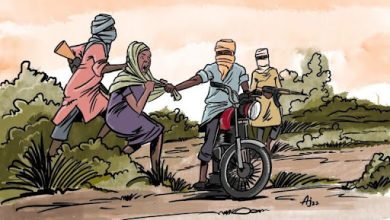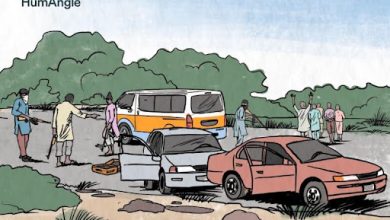Nigeria’s Off-Season Elections: Did Heavy Security Deployments Contain Anticipated Violence?
Reports from civil society organisations showed heavy military presence appeared to have minimised violence and irregularities during off-season elections held in the three states.

Before elections were held in Bayelsa, Imo, and Kogi states last weekend, Nov. 11, there were already many signs of impending violence. But Nigeria’s security forces promised to make sure there was a maintenance of law and order during the process.
Kayode Egbedokun, Nigeria’s Inspector General of Police, said the force has “a large pool of resources to draw from.” Ultimately, that meant about a quarter of the country’s personnel were deployed to the three states. Nigeria has just about 370,000 police officers covering its 36 states and capital city, a ratio of one officer to 600 citizens. Of this number, 92,565 officers were deployed for the off-cycle elections — 40,000 to Kogi, which seemed more susceptible to electoral violence, 27,000 to Bayelsa, and 25,565 to Imo.
There is no publicly available data on the number of Nigerian soldiers deployed for the same purpose. However, residents in Kogi and Imo told HumAngle that soldiers in their hundreds mounted roadblocks in strategic places, surveilling the areas before, during and after the polling exercises. In one viral video, Kogi residents were seen welcoming soldiers in military trucks.
Through posts on social media, especially X (formerly Twitter), some Nigerians wondered why so many soldiers had to be deployed. A section believed the heavy military presence would boost the confidence of voters. “Every Kogi indigene knows that there will be violence on the day of the election. They also know only the military can prevent or at least reduce the carnage,” one user said.
But others disagreed, saying the security forces were reputed to have operated in favour of the ruling party by intimidating voters. In the past, Nigeria’s security forces were accused of partisanship or being used by authorities to manipulate election results.
A few days before the elections, political analyst Ray Morphy warned that rhetoric and signs from the three states showed voters were already scared and intimidated. “Saturday is just an election, not a war,” he said. “Recently in Nigeria, preparing for election has become tantamount to preparing for war.”
The polling took place amid stifling travel restrictions; the police also deployed helicopters and gunboats, and the army sent troops to reinforce security in the three states.
But did the heavy presence of security personnel help curb electoral violence?
Abduction, ballot snatching
On the eve of the election, an official of the Independent National Electoral Commission (INEC) was abducted while waiting to board a boat in Bayelsa. The news of the abduction spread like wildfire, sparking fear across the polling sites. After several hours, INEC confirmed the official had been released. However, some election materials were missing, said to have been lost amid the abduction.
Later that day, security agents foiled an attempt to kidnap another INEC official by suspected political thugs in the Ikeduru area of Imo. A witness told the News Agency of Nigeria that security officials at the scene shot in the air after voters raised the alarm. The thugs quickly retreated into their bus and sped off on hearing the gunshots.
There were also cases of thuggery and ballot box snatching.
In Ayingba, one of the hotbeds of electoral violence in Kogi, a ballot snatcher was gunned down by security agents surveilling the area. In a video that found viral appeal online, the body of the man accused of snatching a ballot lay on the clay street of Ayingba while passers-by wailed. Umoru Iduh, the alleged ballot snatcher, was known for fueling electoral violence in the state before the latest incident, according to two residents, who asked not to be described by their names.
Before the elections, the military and the police declared war against political thugs plotting to snatch ballot boxes. Jamal Abdussalam, an army chief, warned anyone planning to engage in the crime to be ready for the consequences.
“The era of snatching ballot boxes, stuffing them, and indeed any form of electoral violence is gone,” he announced. “No stone would be left unturned to deal decisively with any individual or group whose stock in trade is to cause mayhem or snatch ballot boxes during the elections.”
Bullets, cash and blood
Per assessments by observers, electoral violence was a sore point in the just concluded off-cycle elections. Apart from targeting INEC officials and attempting to snatch ballot boxes or disrupt election exercises, several other electoral irregularities marred polling and electioneering in these states. Bullet spraying and vote buying were the commonest vices that found appeal.
Jonah Daumie, a special assistant to the deputy governorship candidate of the All Progressive Congress (APC) in Bayelsa, was caught with ammunition in the Foibiri area of the state. When security agents grilled Daumie on camera, he admitted the arms he was wielding were used during election activities in the community.
A similar scene played out in Kogi. One local government chairman, James Onoja, was nabbed by security agents for possession of firearms, ammunition and bundles of cash — allegedly meant for vote buying. The council chairman said he regretted his action and begged for forgiveness in a video shared online.
Preliminary analysis by the Centre for Democracy and Development (CDD), a non-governmental organisation focused on democratic governance based in Abuja, confirmed cases of electoral violence across the three states where the off-cycle polls were held.
CDD’s observers reported that one person was shot in the Famgbe community in Yenagoa. The think tank further noted that security agents were not present at PU 24 Ward, where voting ended abruptly after thugs destroyed election materials at about 11:45 a.m.
“Similar instances were reported in Brass PU 7 Ward 7; observers reported that there were no security agents as late as 10:19 am, despite voting having started. Similarly, in PU 9 Ward 4, security officials only arrived at 11:10 am,” the CDD report stated.

Did heavy security presence work?
Security reports from different civil society organisations on the off-cycle elections in Bayelsa, Imo, and Kogi indicated that election exercises were marred by violence, bloodshed, and illicit cash flow.
In its pre-election analysis, the Kimpact Development Initiative (KDI) pointed out that there were at least 110 incidents of election-related violence in the three states from Jan. 1 to Nov. 9. The incidents range from murder, political party clashes, destruction of campaign and private properties, kidnapping, and shootings.
“Kogi had recorded 53 violent incidents pertaining to elections, and we had monitored 35 of such incidents in Imo state, while Bayelsa had 22 verified incidents of election violence,” a report by KDI stated.
In its Nov. 14 report, the group said its Election Day Data Room recorded 50 violence cases across the three states. The report noted that “Imo had the highest number with 19 incidents of violence, while Bayelsa followed closely behind with 17 incidents, and Kogi recorded the lowest number of incidents among the three states, with 14 incidents.”
“The presence of security across the three states is commendable. However, there is a need for security agencies to investigate and prosecute electoral offenders arrested in the Nov.11 off-cycle elections,” KDI said.
On the other hand, Situation Room, another Nigerian civil society organisation, said its observers noted that security agents deployed for election duty opted to collude with politicians and, in some cases, protected the politicians, enabling them to indulge in vote buying and other conducts that compromised the elections in the states. CDD inferred in its report the just concluded elections in these states were conducted against a backdrop of political conflict occasioned by cultism, insurgencies and separatist agitations. It additionally noted that security agencies appeared to have secured the electoral process.
A statement by Egbedokun, Nigeria’s police chief, also corroborated this view as he suggested that security personnel relatively contained violent tendencies during the elections.
On Nov. 14, a few days after the election, the police chief said that he had charged the Electoral Offences Desk Officers under the force to immediately investigate electoral offence incidences recorded.
Egbedokun also commended the police and other security forces for their support during and after the election exercises. He noted that the electoral process in the three states transpired seamlessly, “defying earlier threat assessments and projected challenges from various quarters.”
The efforts of the police and the Nigerian Army were complemented by other security agencies such as the Nigeria Security and Civil Defence Corps (NSCDC), which deployed 22,600 of its personnel, and the Economic and Financial Crime Commission (EFCC).
The EFCC, Nigeria’s anti-graft agency, said it nabbed 14 election offenders and vote-buyers, intercepting a total sum of ₦11,040,000 in Bayelsa and Imo.
Support Our Journalism
There are millions of ordinary people affected by conflict in Africa whose stories are missing in the mainstream media. HumAngle is determined to tell those challenging and under-reported stories, hoping that the people impacted by these conflicts will find the safety and security they deserve.
To ensure that we continue to provide public service coverage, we have a small favour to ask you. We want you to be part of our journalistic endeavour by contributing a token to us.
Your donation will further promote a robust, free, and independent media.
Donate HereStay Closer To The Stories That Matter




